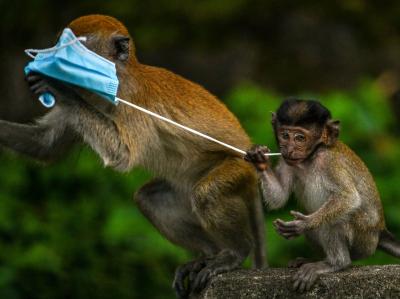A 37-year-old man has been confirmed to have "Virus B" and is in critical condition after being attacked by a group of monkeys in a rural park in Hong Kong, making him the first person in the city to contract this deadly infection. Bloomberg reported that Hong Kong authorities have launched an investigation to determine the true cause of the man's infection, while also urging the public to avoid touching or feeding wild monkeys. The Hong Kong Centre for Health Protection issued a statement advising anyone injured by monkeys to seek immediate medical care.
According to the agency, the man was admitted to the hospital on March 21 due to fever and decreased awareness. Family members noted that he was infected in late February while visiting "Kam Shan" rural park, a well-known hiking spot populated with wild monkeys. A spokesperson for the Hong Kong Department of Health confirmed that this is the first case of the rare infection in the country.
What is Virus B?
Infection with the virus is extremely rare but can lead to severe brain damage or death if the infected person does not receive prompt treatment. Typically, individuals contract the virus after being bitten or scratched by an infected type of monkey known as "macaques," or if they come into contact with the monkey's eyes, nose, or mouth. So far, only one documented case exists of a person transmitting the infection to another, according to the Centers for Disease Control and Prevention.
Macaques are usually infected with the virus but typically do not show symptoms or exhibit only mild disease. Other monkey species, such as chimpanzees and capuchin monkeys, can also contract the virus and often die from the infection. There have been no documented cases of transmission of the virus from other monkeys, aside from macaques, to humans until today.
Infection with "Virus B" in humans is rare, with only 50 cases recorded since the virus was discovered in 1932, of which 21 resulted in death. Most of these individuals were infected after being bitten or scratched by a monkey or when monkey tissues or fluids came into contact with their wounds. In 1997, a researcher died from the virus after infected bodily fluids splattered into her eye.
Experts recommend avoiding any area where macaques are present to prevent bites or scratches and advise against touching or feeding them. There are no vaccines that can protect against the virus, but experts emphasize the importance of immediate first aid following an attack by a macaque, which includes washing the wound thoroughly with soap, detergent, or iodine for 15 minutes. Following this, antiviral medications may be administered to help reduce risks.




